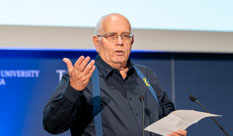More:
News & Stories
A research grant from the Ministry of Science and Technology to HIT
A research grant from the Ministry of Science and Technology to HIT
An innovative algorithm for identifying quotations and references in Jewish-historical texts, developed at the department of computer sciences, receives a grant from the Ministry of Science and Technology.

Dr. Jonathan Schler
Dr. Jonathan Schler, head of the Department of Computer Sciences in collaboration with two researchers from Bar Ilan University, received a research grant from the Ministry of Science and Technology in the amount of NIS 320,000 for the development of an algorithm that will help identify citations and references in Jewish historical texts.
This is the first grant after the opening of the Master's degree in Computer Sciences at HIT and it enables the department to employ postgraduate research students, promote and give a real boost to research at the Institute.
The purpose of the study, entitled: Global and Local Quotation Networks as a New Paradigm for the Study of Plurality of Opinions in Historical Literature: The Rabbinical Literature Corps as a Case Study, is to develop an automatic algorithmic approach to identifying quotations and references in Jewish-historical texts. The links that will be identified will be used to analyze the development of the different approaches created over time, the different groups of thinkers and schools - and to automate the construction of their profiles.
The researchers, Prof. Maayan Zhitomirsky-geffet, from Information Systems Dept. and Dr. Benjamin Katzoff, a Talmudic scholar, together with Dr. Jonathan Schler, an expert in machine learning, offer a paradigm and a new conceptual framework for studying the multiplicity of perspectives in historical literature. A computation based on advanced machine learning algorithms that will be examined in the subfield of rabbinic literature as a test case.
"Rabbinic literature is characterized by a multiplicity of points of view and the existence of controversies that have their roots in previous sources and their influence continues in the literature of future generations," explains Dr. Schler. " we will use methods and knowledge from the traditional research of rabbinic literature to investigate whether, and to what extent, the authors' perspectives are expressed in the networks received, and whether authors with strong connections in the networks share the same views."
Posted: 19/12/2021
- News & Events
New Collaboration with Sheba Medical Center will qualify nurses to work in a digital environment.
Collaboration between HIT Holon Institute of Technology, the teaching authority of the Sheba Medical Center, and the Sheba-BEYOND virtual hospital will allow training nurses in Israel and around the world to work in a digital...



 Additional programs
Additional programs
